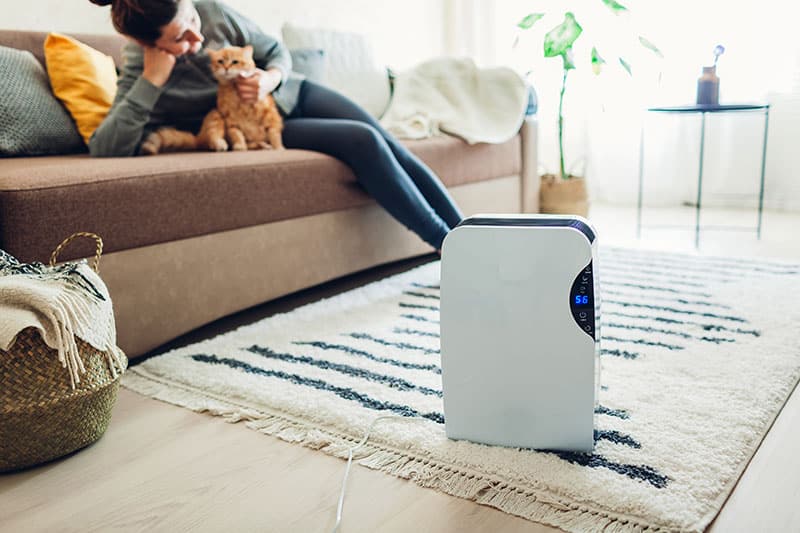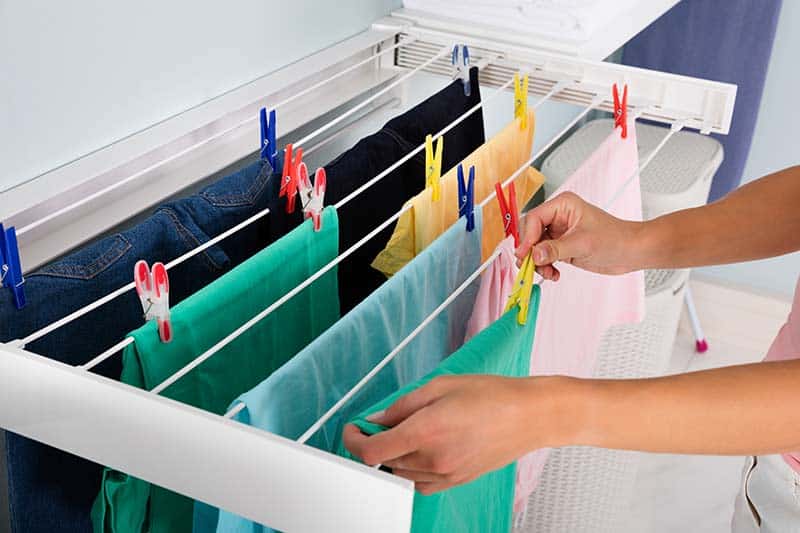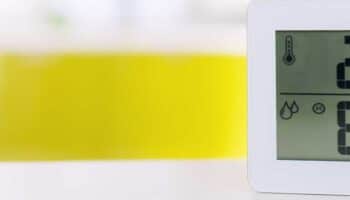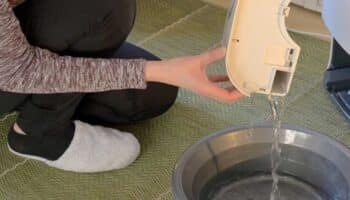A good dehumidifier always comes in handy.
The benefits are more extensive than their simple function would suggest. They not only help remove moisture from the air for our comfort, but they can inhibit mold, supercharge your AC, and even send bugs scurrying.
However, new buyers are faced with a problem they might not have expected. Deciding between one of these units and a desiccant alternative.
Does it even matter?
Which one is better depends on your climate, your needs, and your relative moisture levels. In normal home temperature ranges, both types of dehumidifiers can get the job done, but usually one is the clear winner.
We’ll break down the differences for you here based on different categories, so you can make the choice that’s best for you.
Ready to get some answers? Let’s dive in!
What Exactly Are Dehumidifiers?
Dehumidifiers do exactly what you would think; they remove ambient moisture from the air. Although this seems simple on the surface, the impacts of drier air can provide benefits in both the short and the long term.
In the short term, drier air just feels better. Your body’s primary heat regulation system is sweat. As it evaporates into the air, it takes some of your heat with it. Moist, heavy air feels warmer because it’s harder for water to evaporate into air already full of it.
It’s like continuing to pack an overfull suitcase. It just doesn’t work.
In extreme cases, humid air can start making surfaces in your house just wet enough to feel sticky. Paper can turn a little more fragile and pens don’t write as well.
These sorts of problems can clear up very quickly after plugging in your dehumidifier.

The long-term benefits are surprisingly numerous. Just take a look at how much a dry home can do to improve your comfort and health, not to mention save you money:
- Mold reduction: Mold grows best in warm, wet spaces. Taking away the moisture can slow or halt the growth of mold, and prevent it from releasing those spores that can make you or your family sick (or at least congested).
- Dust mite elimination: Tiny arachnids live in the shadowed spaces of your home, eating the dead skin cells that wash up there and turning them into something far worse. Dust mite waste products can cause a lot of allergies—but don’t fear! Dust mites need a relative humidity of 65% to live. Your dehumidifier will clear up these dusty foes in no time!
- Spider and other bug removal: Insects often get all their water from the ambient humidity in the environment. Cut off the humidity, and they’ll pack their bags for greener pastures. Spiders will soon follow, and you won’t need to invest in expensive exterminators or dangerous chemicals.
- Air conditioner supercharging: This one goes back to the principle of drier air feeling cooler. Typically, well-dehumidified air can feel a few degrees cooler, and that’s a few degrees higher than you can set your AC. Every degree of difference can save noticeable amounts of money! In addition, since the AC dehumidifies air itself, this can help take some of the load off the poor machine.
- Drier clothes for less: Many of us like to let our clothes hang to dry, but depending on our living situation and the season, we can’t always leave them outside. Hanging clothes to dry inside is a great money saver compared to dryer use, but it releases a lot of moisture into the air. Not only can a dehumidifier clear up that moisture, but it can speed up the drying process as well!

Think about which of these would really change your life, and which aren’t as exciting. We’ll come back to this as we discuss the differences between the types of dehumidifiers.
Comparing Compressor vs Desiccant Dehumidifiers
Compressor Dehumidifiers
The compressor dehumidifier is probably what you have in mind if your familiarity with the appliances is from a decade or two ago or from childhood. These work a lot like an air conditioner does, except that they’re not designed to expel warm air outside.
A compressor dehumidifier uses a fan to draw moist ambient air across its cooling coils. These cold metal pipes cause the water in the air to instantly condense, just like water on your glass of ice water in the summer. This condensed water drips into the reservoir (or down the hose pipe if you have one), while the cold air mixes with the heat exhaust to be expelled out.
There’s no shying away from the fact that these machines can be noisy.
They commonly register between 50-60 decibels—or even higher. That’s somewhere between the volume of a conversation at home and the volume of that same conversation in a restaurant. It’s not thunderous, but it’s not quiet either.
This means that if you’re looking for a good dehumidifier for a room someone’s sleeping in, you might want to avoid a compressor.
The other major point of caution is temperature. Since these appliances rely on condensation, they need to cool their coils down below the ambient air temperature. This can become a problem if the room is below about 65℉. The coils can actually start to freeze, which can damage them. Not to mention that it costs more to cool down more. Compressor dehumidifiers are cheaper when it’s warmer.
Desiccant Dehumidifiers
A desiccant dehumidifier dries out the air by running it through a super absorbent material (the desiccant). This acts like a sponge, siphoning a lot of water from the air very quickly. The appliance uses energy to get the water back out of the desiccant into a reservoir so that you can keep reusing it.
Contrary to what some fear, you never have to replace the desiccant in one of these dehumidifiers!
Desiccant dehumidifiers have some really great traits. They don’t use condensation to take water out of the air, which means they don’t need to cool down. That lets them function at any temperature above freezing!
Compared to compressor dehumidifiers, desiccant variants are also super quiet. At lower speeds, they don’t go much above 40 dB. The lack of a compressor also means they’re a lot lighter—about 10 lbs less than their compressor counterparts.
Of course, there wouldn’t be a debate between the two types if it were all better than compressor dehumidifiers.
The most obvious difference is one of heat. Yes, desiccant dehumidifiers can work at low temperatures, but the air they expel is 10-15℉ hotter than the ambient air temperature. Unless you’re trying to heat up a room, that’s a lot more than the three or so degrees a compressor dehumidifier adds.
They also can cost a bit more to run. Since compressor dehumidifiers work better at higher temperatures, they tend to consume less electricity anywhere above 68℉. The difference isn’t enormous, but when every cent counts, consider what will be cheapest for you.
Some desiccant dehumidifiers come with a specialized laundry mode that lets them work their magic on your laundry in a short amount of time. Compressor dehumidifiers don’t have this same ability, so if you want dry clothes fast, a desiccant dehumidifier may be right for you.
One last word of warning: since the desiccant absorbs the water, it can also absorb ambient odors. While the problem won’t persist for too long, a noxious smell can get trapped in the dehumidifier for a little while. Since it can heat up so much, they can sometimes return. Keep this in mind for an office setting or any other place where an out-of-place smell can become a big issue.
| Compressor | Desiccant | |
| Working Temperature | 60℉ and up | 33℉ to about 77℉ |
| Noise Level | 50-60dB | ~40dB |
| Heating Effect | ~3℉ | 10-15℉ |
| Weight | Varies (Heavy) | Varies (10lbs Lighter) |
| Liters of Extraction per Day | Over 30L at higher temps | ~10L |
| Special Ability | — | Laundry Mode |
Conclusion
Desiccant dehumidifiers are the cool new kid on the block, and they have some serious advantages. However, compressor dehumidifiers have less of an impact on your temperature and still outperform at extremes.
Your particular situation will dictate which dehumidifier is right for you. No matter what choice you make, you’ll be sure to enjoy some great benefits quickly.
Thank you for checking out this article! For other appliance tips, consider checking out our related articles below. On the site, you’ll always find all sorts of solutions for common appliance/power tools-related issues, such as a gas stove that keeps clicking.
Have a great week!
— Craig.
Frequently Asked Questions
Can a Desiccant Dehumidifier Be Used in Larger Spaces?
Yes, but you must choose wisely.
While these dehumidifier variants can be used in larger spaces, they might come up short when compared to compressor alternatives. Also, selecting the wrong size can bring diminishing returns.
Make sure to check with a professional before buying a dehumidifier that might not suit your needs.
What’s the Average Price of a Desiccant Dehumidifier?
You can find these dehumidifiers in several price ranges.
Some units can go for as little as $60, while other more complex alternatives with larger capacities can go up to $370 or more.
Are Compressor Dehumidifiers Noisy?
Given their internal design, which includes, of course, a compressor, and a set of fans, these appliances can be a little noisy sometimes.
However, there are many models out there with low noise ratings (40-60 dB), which will be hardly noticeable, even on the quietest nights.







